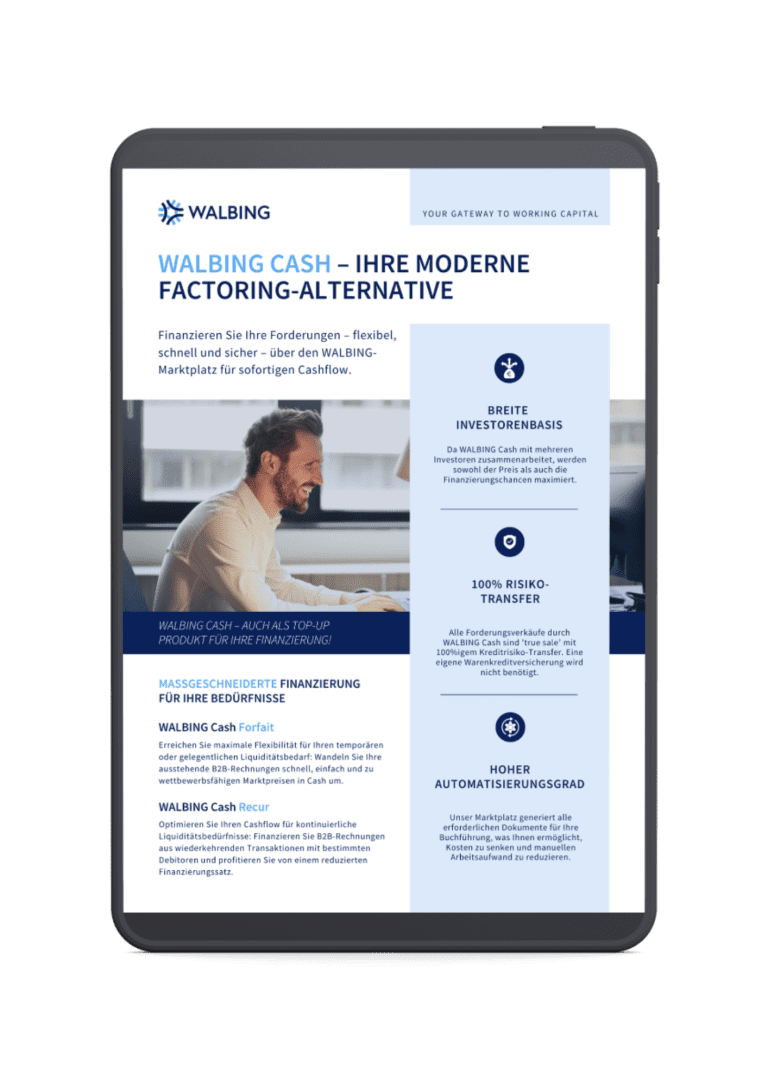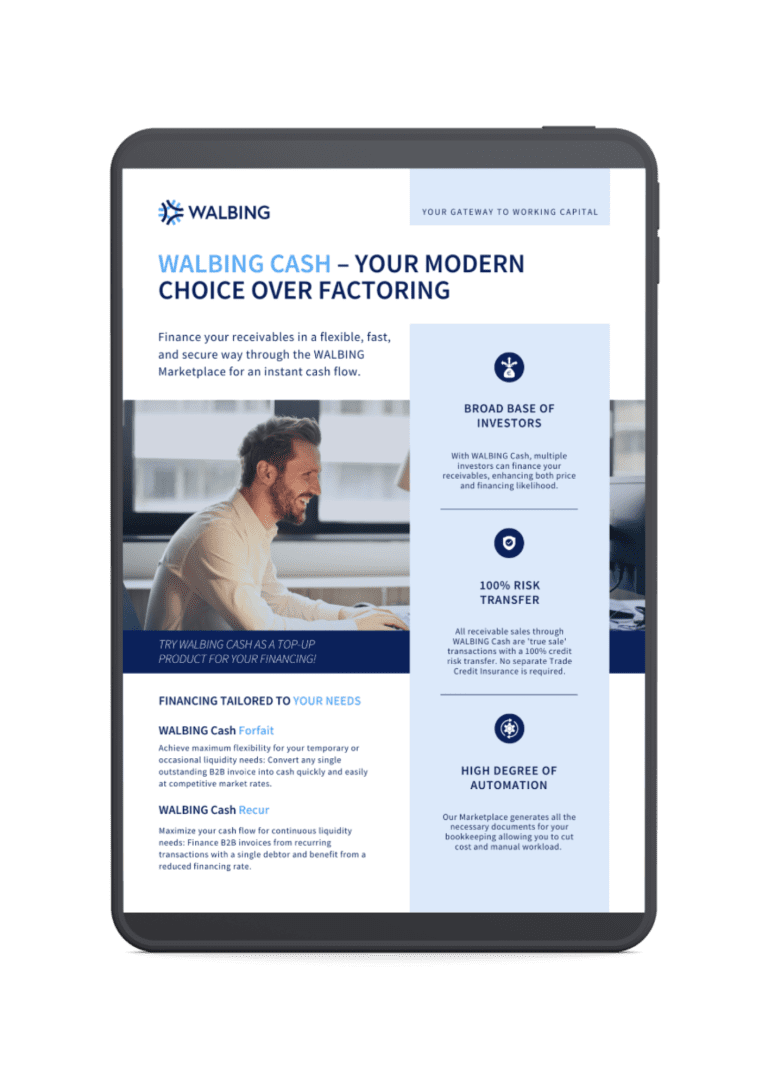WALBING RESOURCES
Frequently Asked Questions
Looking for more information about WALBING products? Want to know more about Embedded Finance and the functionalities available in our on-platform solutions? Look no further!
Quick Navigation
Getting started
Can I test WALBING receivable financing?
Our team is happy to provide a demo of WALBING products and consult on the best use case for your company at any time. To book a demo, simply fill in the form and our Sales/Customer Success teams will be in touch to schedule a (virtual) meeting.
How do I register an account?
Company accounts are registered on the WALBING Platform by completing the platform registration form. WALBING conducts KYC/AML checks and invites master user and legal representative(s) to complete a video identification procedure before the account is activated.
How long does it take to register?
In most cases, it takes less than 1 h to register and start using the WALBING Marketplace.
What data is required for registration?
We'll ask you to provide the following information to sign up for the WALBING Marketplace:
Company:
- Country of incorporation
- Legal form
- Company name
- VAT number
- Registration authority
- Registration number
- Settlement bank account
Master user/legal representatives:
- Full name
- Position
- Phone number
- Date of birth (legal representatives)
- Language (legal representatives)
Beneficial owners:
- Full name
- Date of birth
- Place of birth
- Nationality
- Address of residence.
What WALBING products can I use on the platform right away?
The following WALBING products are available to the registered users through our platform:
- Receivable Financing with WALBING Cash – Forfait and Recur.
Our products WALBING Cash Embed and WALBING Pay are Embedded Finance solutions that can be integrated on demand into your tech stack. Reach out to our team for a consultation.
What types of accounts are there on the platform?
Due to differences in registration procedures, there are two types of accounts on the WALBING platform: Investor and Seller/Debtor.
By default, every registered company is a Seller/Debtor. This means that company accounts can act both as suppliers/sellers or debtors, switching between the two roles as required for the specific transaction.
Consider the following example:
- Company A registers as a supplier/seller to finance invoices against Company B.
- Company B joins the Marketplace as a debtor to provide an IPU for A's invoices.
- Later on, Company B uses its account as a supplier/seller to finance an invoice bundle against another company – C.
To become an investor, there are additional requirements. Please reach out to our customer success team if this is what you want to do.
Every user profile has an Admin area, where the account data is managed.
WALBING Cash: Information for Sellers/Suppliers
Who can sell receivables?
Sellers/suppliers are legal entities registered in the commercial, cooperative, or association register in one of the supported countries. Seller companies are required to have a valid VAT number.
Are there any geographic requirements?
WALBING Cash is available to receivable suppliers/sellers from the folowing countries (July 2023):
- Germany
- Austria
- Belgium
- Cyprus
- Czech Republic
- Estonia
- Finland
- Ireland
- Latvia
- Luxembourg
- Malta
- Poland
- Spain
- Sweden
- Switzerland
- The Netherlands
We are constantly working on adding more countries to this list.
WALBING Cash has almost no limitations on debtor countries of origin, with the exception of sanctioned countries.
What receivables can be offered?
Receivables that can be sold through WALBING Cash must be:
- individual invoices, collective invoices, or settlement lists that are due in more than 11 days at the time of sale
- in one of the four currencies: EUR/USD/GBP/CHF
- have a minimum total of EUR/USD/GBP/CHF 300.
What is a receivable bundle?
A receivable bundle is a group of invoices against a single debtor. Such invoices can be bundled and sold as a package if their due dates are not more than 14 days apart.
What is a disclosed assignment?
Receivables are sold on the WALBING platform with a disclosed assignment only, meaning that the debtor is notified before the invoice is sold. The disclosed assignment is a benchmark practice in trade finance that helps increase the asset value and comes with an option for the debtor to provide an IPU (Irrevocable Payment Undertaking).
How can I upload my receivables?
There are two options for uploading receivables:
- manual upload per drag & drop
- with the help of our Excel/XML templates.
- API upload (with Embedded Finance integration)
In all cases, our software will automatically recognize and extract the necessary invoice details. After your invoice is verified by WALBING, it can be offered for sale.
Who are the buyers?
Buyers of receivables on the WALBING Platform are usually institutional investors.
Do I need receivable insurance?
No. Sellers/suppliers place uninsured receivables for sale through WALBING Cash/WALBING Marketplace.
What payment term can a receivable have?
Receivables sold on the WALBING platform can have payment terms of up to 180 days. The due date of a receivable does not change after the receivable is sold.
How does receivable financing with retention work?
All financing transactions on the WALBING Marketplace are subject to 10% retention to maintain a low-risk environment.
Retention means that, after a receivable is sold, the seller receives 90 percent (minus discount) of the receivable total. The remaining 10 percent is paid out once the debtor settles the payment.
When will I receive my payout?
After a receivable is sold, the seller usually receives a payout within 24 h (depending on the seller's bank policies).
What happens if debtor does not pay (on time)?
Where a receivable is not settled by the debtor on the due date, WALBING initiates a collection procedure.
As a licensed collector, WALBING offers out-of-court collection services. Court collection cases are handed over to specialized law firms.
WALBING Cash: Information for Debtors
Do I have to register on the WALBING Marketplace as a debtor?
The debtor is notified by WALBING once a supplier/seller offers the first receivable against them on sale.
The goal is to verify the debtor-seller relationship, whereas the debtor is required to check and confirm the receivable data provided by the seller.
Once completed, the receivable in question as well as other receivables involving the verified parties can be sold.
All registered debtors are subject to AML checks.
Do debitors have to register on the WALBING Marketplace?
No, debtors are not required to register an account for invoices against them to be financed through the WALBING Marketplace. However, we recommend debtors complete their registration to be able to provide IPUs as it is a benchmark practice in trade finance.
What is an IPU and how can I provide it?
Debtors can provide an Irrevocable Payment Undertaking (IPU) to acknowledge outstanding payments. Only registered debtors can provide an IPU that enhances the value of the receivable.
Registered users can access the IPU option in the debtor area of the WALBING Marketplace. They can also sell receivables.
As a debtor, how should I handle my payments?
WALBING automates all payments between the parties.
Once an invoice is sold, the debtor is notified about the new assignment and pays before/on the due date to the WALBING escrow account.
Embedded Finance Solutions
What is Embedded Finance?
Embedded finance refers to the integration of financial services into non-financial platforms or applications. It involves bringing financial products and services directly to customers within the context of their everyday activities, rather than requiring them to visit separate banking or financial institutions.
What Embedded Finance products does WALBING offer?
WALBING offers the following embedded finance products:
- WALBING Cash Embed – a solution for receivable financing integrated via a single API into the customer's UI/tech stack. This is a product for B2B marketplaces and B2B companies that would like to set up receivable financing or a complete supply chain finance program directly in their tech stack.
- WALBING Pay Later – a Buy Now Pay Later solution for the check-out with third-party receivable financing.
- WALBING Pay Guard – a Buy Now Pay Later solution for check-out with integrated Trade Credit Insurance that provides 100% coverage in case of non-payment by debtor or default.
Contact our team to schedule a consultation or a product demo.
How does integration work?
WALBING embedded finance product integration works via a single API - WALBING API Suite Sanya®. To simplify the integration process, WALBING provides customers with comprehensive API documentation and a sample UI design.
Contact our team to schedule a consultation.





